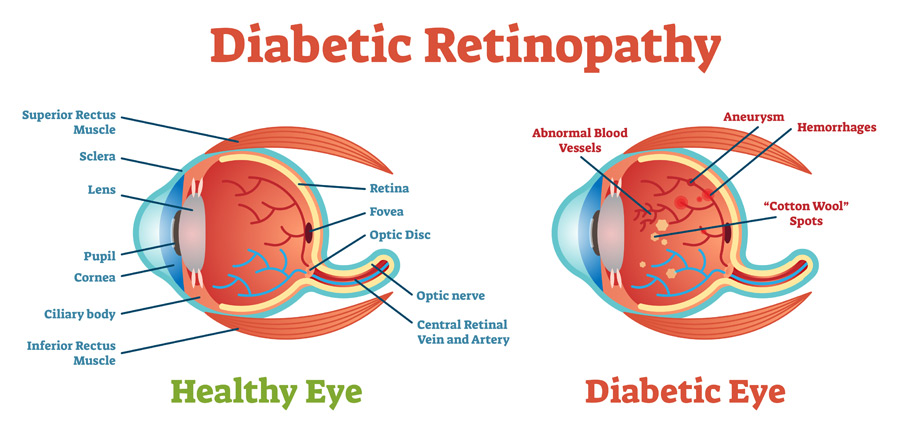Diabetic
Eye Exams
What is Diabetic Eye Disease?
Diabetic eye disease refers to a group of eye diseases that affect people who have Type 1 or Type 2 diabetes, including diabetic retinopathy, cataracts, diabetic macular edema, and glaucoma.
Diabetic eye disease can damage the eyes and result in poor vision or blindness, particularly if blood sugar levels are not controlled over time. High blood sugar can damage the blood vessels in the back of the eye, which may leak fluid or cause swelling. There may not be any symptoms of diabetic eye disease in the early stages, and the risk for damage to the eyes and vision increases if blood sugar levels and/or blood pressure levels aren’t properly controlled.
Diabetic retinopathy affects the blood vessels in the retina (the light-sensitive layer in the back of the eye) and is the most common cause of vision loss and blindness for diabetics.
In the early stages of diabetic retinopathy, there usually aren’t any obvious symptoms. However, in the advanced stages as the blood vessels start to bleed into the vitreous (a gel-like fluid that fills the eyes), dark, floating spots or streaks may appear in someone’s vision.

The longer a person has diabetes, the higher the risk of developing diabetic retinopathy. Women who have diabetes who then get pregnant, or who develop diabetes while pregnant (gestational diabetes) are also at a higher risk to develop diabetic retinopathy. If you are pregnant and have diabetes, you will need a diabetic eye exam.
Cataracts are common in people as they age, but they can develop at an earlier age for diabetics. Cataracts cause the front part of the eye to become cloudy. Symptoms include hazy or blurry vision, seeing faded colors, reduced night vision, increased sensitivity to light, and, over time, loss of vision.
Diabetic macular edema occurs when there’s a build-up of fluid and swelling in the macular, which is the part of the retina used to see clearly while looking straight ahead at people’s faces, driving, and reading. Diabetic macular edema can lead to either partial vision loss or blindness.
Diabetic Eye Exam
If you have Type 1 or Type 2 diabetes, then you need a comprehensive eye exam at least once each year. Your eye doctor may recommend coming in more often based on your individual needs and health history. The expert doctors at Walter Eye Clinic will perform special tests as part of your diabetic eye exam to screen for signs of diabetic eye disease.
To schedule a diabetic eye exam at our office in Tinley Park, contact us today.
